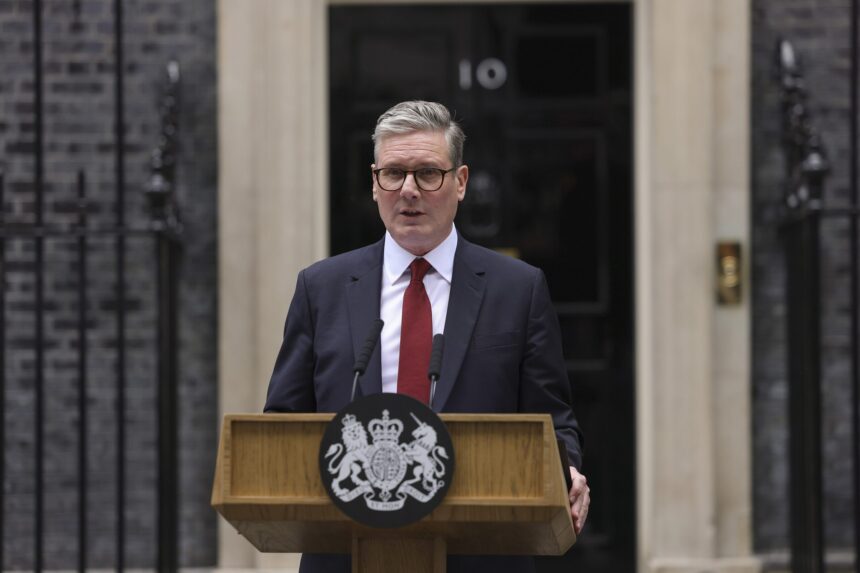Prime Minister Sir Keir Starmer has confirmed that the United Kingdom will not ease visa rules for Indian workers or students, even as he arrived in India to promote a new trade agreement aimed at deepening economic and cultural ties between the two countries.
Leading a high-profile delegation of more than 100 entrepreneurs, cultural figures, and university vice-chancellors, the British leader is seeking to bolster investment flows and revitalize the UK’s sluggish economy through closer cooperation with one of the world’s fastest-growing markets.
Sir Keir described the visit as an opportunity to unlock “massive opportunities” for both nations, but made it clear that immigration policy would not be part of those discussions.
“The issue is not about visas,” he told reporters before landing in Mumbai. “It’s about business-to-business engagement, investment, jobs, and prosperity coming into the United Kingdom.”
Trade Deal Promises Economic Gains but No Immigration Concessions
The UK-India trade agreement, signed in July after years of complex negotiations, is expected to deliver a multi-billion-pound boost to both economies. The deal will lower tariffs on British exports such as cars and whisky, making them more affordable in India, while Indian textiles and jewellery will face fewer barriers entering the UK market.
A key element of the pact is a three-year exemption from social security contributions for Indian employees working temporarily in the UK — a measure designed to promote short-term mobility for skilled professionals.
However, the British government has emphasized that the agreement does not include any broader changes to immigration policy. Ministers reiterated that the Labour government remains committed to reducing overall migration levels, a stance reinforced by the party’s recently announced tougher settlement policy at its annual conference.
‘Visas Played No Part in Trade Deal’ – Starmer Clarifies UK’s Position
Speaking to journalists aboard his flight to India, Sir Keir stressed that visa policy “played no part” in the trade negotiations and that this position “has not changed.”
When asked whether the UK might open new pathways for Indian technology entrepreneurs, particularly in light of US President Donald Trump’s changes to the H-1B visa program, Starmer maintained his firm stance.
“The UK wants to attract top talent from across the globe to help drive our economy forward,” he said, “but there are no plans for new visa routes to India.”
Despite ruling out visa flexibility, the visit has already seen tangible outcomes in the travel and aviation sectors. British Airways announced plans to launch a third daily flight between Delhi and Heathrow next year, while Manchester Airport revealed a new direct route to Delhi, enhancing connectivity between the two nations.
Diplomatic Engagements and Cautious Stance on Russia
During his two-day visit, Prime Minister Starmer is expected to meet Indian Prime Minister Narendra Modi to discuss trade, climate cooperation, and global security.
Ahead of the visit, Modi drew attention by sending “warm birthday greetings” to Russian President Vladimir Putin on social media — a move that drew international scrutiny.
When asked if he intended to do the same, Starmer was unequivocal:
“Just for the record, I haven’t sent birthday congratulations to Putin, nor am I going to do so,” he said. “I don’t suppose that comes as a surprise.”
Pressed on whether he would raise concerns with Modi over India’s ongoing imports of Russian oil, Starmer said the UK’s focus remains on targeting Russia’s ‘shadow fleet’ — a network of unregulated tankers that transport Russian oil across international waters in defiance of sanctions.
“The United Kingdom has been one of the lead countries addressing the shadow fleet,” Starmer explained, highlighting Britain’s role in global efforts to curb Moscow’s oil revenues.
Balancing Trade Ambition and Immigration Control
The visit underscores the delicate balance the Labour government is trying to strike between promoting global trade and controlling immigration — a politically sensitive issue at home.
While the new trade deal with India signals a significant economic opening, Sir Keir’s remarks make clear that London will not pair trade expansion with broader visa liberalization.
Instead, the UK’s strategy appears focused on deepening business partnerships, boosting exports, and enhancing cultural and academic cooperation, all while maintaining strict immigration controls.
As Sir Keir meets India’s top political and business leaders, observers say his visit represents an early test of Labour’s ability to pursue a “pro-trade but firm on immigration” agenda — a balance that will define Britain’s post-Brexit economic diplomacy in the years ahead.






